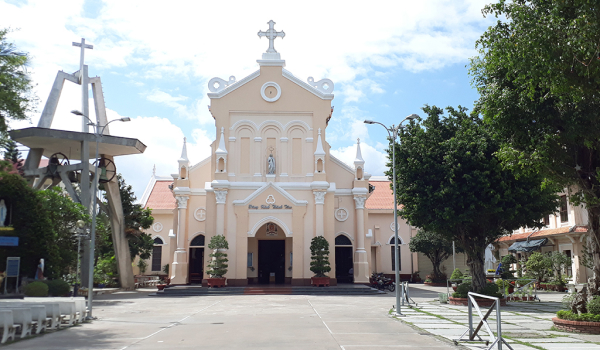
In a land area of 13,423.10 square kilometers, the diocesan territory covers Can Tho city and three provinces of Bac Lieu, Ca Mau, Hau Giang and Soc Trang. The diocese is bounded on the northeast by Vinh Long diocese, northwest by Long Xuyen, west by Gulf of Thailand and east by sea. It is one of four dioceses in the Mekong Delta River.
The diocese had a population of 5,598,951 as of 2016. It has minority ethnic groups of Cham, Chinese, Khmer, Kinh, Muong, Nung, Tay and Thai.
Vietnamese is mainly spoken in the area. Ethnic languages are only used within ethnic minority communities.
Can Tho vicariate was erected on Sept. 20, 1955 when it was separated from Phnom Penh diocese. Bishop Paul Nguyen Van Binh built a minor seminary and the bishop's house. He also established the Adorers of the Holy Cross in Soc Trang province.
The vicariate was elevated into a diocese in 1960 after the local Church hierarchy was founded on Nov. 24, that year.
At that time, the diocese had 56,200 Catholics served by 67 priests and 220 nuns.
Bishop Phillip Nguyen Kim Dien succeeded Bishop Binh who became archbishop of Sai Gon archdiocese in 1960. Five years later, Bishop Jacob Nguyen Ngoc Quang succeeded Bishop Dien who became archbishop of Hue. Bishop Quang served the local Church until his death in 1990.
13 years after the country was reunified under communist rule in 1975, Saint Pierre Doan Cong Quy Major Seminary based in Can Tho city was open in 1988. It provides priestly formation for students from three dioceses of Can Tho, Long Xuyen and Vinh Long.
The diocese provides scholarships for poor students in remote areas, build houses for underprivileged people and bridges in rural areas. It also gives health care, food, clothes clean water boats, bicycles and wheelchairs to people in need.
Local Church people evangelize local ethnic groups.
The diocesan patron is Sacred Heart of Jesus, June 11.
Diocesan website: www.gpcantho.com
The diocese is located in the Mekong delta and the land is crisscrossed with canals and rivers. People travel by motorbikes, buses, boats and airplanes. Can Tho Airport based in Can Tho city, the only airport in the Mekong River Delta, has flights to and from Ha Noi, Ho Chi Minh city and Phu Quoc islands.
The region has two seasons. The hot season lasts from May to November, and the rainy season lasts from December to April. During the rainy season, local people suffer much because of floods.
Personal incomes
The average income per head of residents in 2009 was from 14 million dong (US$740 as of June 2010) in Soc Trang province to 25 million dong (US$1320 as of June 2010) in Can Tho city. In provinces of Bac Lieu and Ca Mau, it was 17 million dong.
80 per cent of the population is farmers who cultivate mainly rice and raise fish, shrimps and crabs. They also raise pigs, cows, chickens, ducks.
According to government records, over 90 per cent of local people are reportedly literate. Local religions are not allowed to run schools and hospitals except for day care centers.
The region has followers of Buddhism, Cao Dai, Christianity and Hoa Hao. Cao Dai, a syncretic belief system, and Hoa Hao, a Buddhist sect, were both founded in southern Vietnam.
Pilgrim center
The popular tomb of Father Francis Xavier Truong Buu Diep, located in the compound of Tac Say church in the southern province of Bac Lieu, attracts 100-200 pilgrims from various faiths every day. They visit the tomb to pray, give offerings and even place bottled water and medicine on the tomb.
Tens of thousands of pilgrims throughout the country visit the tomb and mark the anniversary of Father Diep's death on March 12.
Born in 1897 in An Giang province, Father Diep was ordained a priest in Phnom Penh (Cambodia) in 1924. After he returned to Vietnam, he taught at a local seminary and served as pastor of Tac Say parish for 16 years. He also founded many parishes in the area and helped local poor people regardless of their background.
When many people fled to avoid fighting between the French and Viet Minh forces just after World War Two, Father Diep decided to stay with the local people.
He and 70 other Catholics were arrested by anti-Catholicism soldiers on March 12, 1946. He offered his own life in place of the 70 people after hearing that soldiers planned to burn them to death. He was stripped naked, beheaded and his body thrown in a small pool.